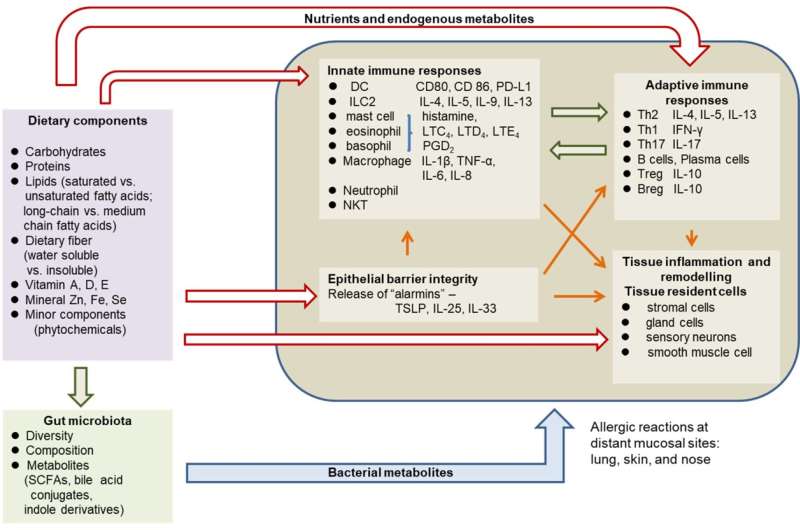This article has been reviewed according to Science X's editorial process and policies. Editors have highlighted the following attributes while ensuring the content's credibility:
fact-checked
peer-reviewed publication
trusted source
proofread
Plant-based diet may be useful in treating allergic diseases associated with obesity

Allergic diseases are a group of chronic inflammatory disorders of the lung, skin and nasal epithelium characterized by aberrant IgE and Th2 cytokine-mediated immune responses to exposed allergens. A wide range of nutrients and dietary components have been shown to play critical roles in the prevention or treatment of allergic diseases through host and gut microbiota-derived metabolites.
In a study published in Nutrients, Zhang Ping of the Xishuangbanna Tropical Botanical Garden (XTBG) of the Chinese Academy of Sciences reviewed recent advances in the understanding of diet and food components as contributing factors in the etiology of allergy, molecular targets of nutrient regulation of immune cells and structural cells involved in allergy, and clinical findings on nutritional intervention in the treatment of allergic diseases.
The researcher conducted a systematic literature search and reviewed the most relevant articles. The literature review showed that diet and nutrition play a key role in the development and severity of allergic diseases by regulating tissue and immune homeostasis. The identified dietary and nutritional risk factors for allergy are high energy, high protein, high saturated fat, n-6 fatty acids, medium-chain fatty acids, cholesterol, low total dietary fiber, low vegetables and fruits, high simple sugars and processed foods, low levels of minerals Zn and iron and vitamins A, D, and E.
Excessive calories, high intake of protein and saturated fat, or lack of dietary fiber and micronutrients can trigger the immune system's defense mechanism and prepare the host for allergic reactions. Therefore, calorie restriction, coupled with adequate dietary fiber and adequate macronutrient intake is essential for maintaining immune tolerance to allergens.
Since plant-based diets are enriched in micronutrients and dietary flavonoids, which are associated with potent anti-inflammatory and anti-allergy effects, the researcher suggested that a plant-based diet may be particularly useful in the treatment of severe allergic diseases associated with obesity.
More information: Ping Zhang, The Role of Diet and Nutrition in Allergic Diseases, Nutrients (2023). DOI: 10.3390/nu15173683



















